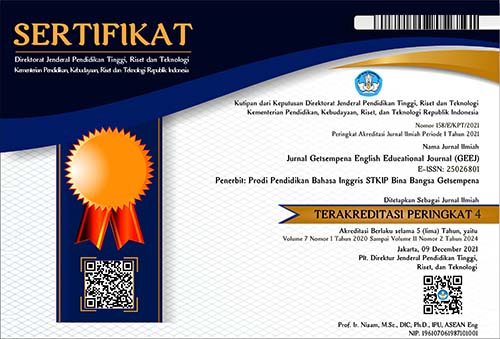INVESTIGATING TEACHERS’ STRATEGIES TO PROMOTE LEARNER AUTONOMY IN ENGLISH LANGUAGE TEACHING (ELT) PRACTICE
Abstract
More and more educational stakeholders are now concerned on learner autonomy (later will be abbreviated as LA) as a fundamental key to actualize an effective and successful instructional process. While research addressing strategies to promote LA has been conducted in ample amount, this research tries to include a more holistic coverage. This research aims at investigating strategies or activities that teachers implement in English language classroom in fostering LA, what reasons are behind the selection of those activities, and to what extent those activities enable LA to take place. Data were collected from 35 teacher respondents who have taught junior high school or higher levels. Questionnaire and semi-guided interview were employed to yield relevant data. Findings show that activities related to psychological dimension become the most favoured ones to apply in the classroom. It is followed by social, technical, and political dimensions accordingly. Those activities are applicable to certain situations and extent.
References
Benson, P. (2007). Autonomy in language teaching and learning. Language Teaching, 40, 21-
Borg, S. & Al-Busaidi, S. (2012). Teachers' beliefs and practices regarding learner autonomy.
ELT Journal, 66(3), 283-292.
Chan, V. (2001). Readiness for learner autonomy: What do our learners tell us? Teaching in
Higher Education, 6(4), 505-518.
Cotteral, S. (2008). Autonomy and good language learners. In C. Griffiths, Lessons from good
language learners (110-120). Cambridge: Cambridge University Press.
Dafei, D. (2007). An exploration of the relationship between learner autonomy. Asian EFL
Journal.
Elizondo, L. B., Garita, C. O. (2013). A closer look into the EFL classroom. Revista De Lenguas
Modernas, 325-343.
Lengkanawati, N. S. (2016). Teachers' beliefs about learner autonomy and its
implementation in Indonesian EFL setting. In R. Barnard & J. Li, Language learner autonomy: Teachers' beliefs and practices in Asian contexts (134-149). Phnom Penh: IDP Education Cambodia Ltd.
Loi, N. V. (2016). Learner autonomy in Vietnam: Insights from English Llanguage teachers'
beliefs and practies. In R. Barnard & J. Li, Language learner autonomy: Teachers' beliefs and practices in Asian contexts (134-149). Phnom Penh: IDP Education Cambodia Ltd.
Madrunio, M. R., Tarrayo, V. N., Tupas, R., & Valdez, P. N. (2016). Learner autonomy:
English language teachers' beliefs and practices in the Philippines. In R. Barnard & J. Li, Language learner autonomy: Teachers' beliefs and practices in Asian contexts (114-133). Phnom Penh: IDP Education Cambodia Ltd.
Sakai, S. & Takagi, A. (2009). Relationship between learner autonomy and English language
proficiency of Japanese learners. The Journal of Asia TEFL, 6(3), 297-325.
Simjanoska, D. K. (2015). The role of the teacher in fostering learner autonomy. In B.
Xhaferri, et al, Promoting learner autonomy in higher education (51-62). Tetovo.
Tapinta, P. (2016). Thai teachers' beliefs in developing learner autonomy: L2 education in Thai universities. In R. Barnard & J. Li, Language learner autonomy: Teachers' beliefs and practices in Asian contexts (96-113). Cambodia: IDP Education Cambodia Ltd.
Xhaferri, B., Waldispuhl, M., Hotz, B.E., & Xhaferri, G. (2015). Students' and teachers' beliefs
about learner autonomy at SEEU Tetovo, Macedonia, and PH Zug, Switzerland: A comparative study. In B. Xhaferri et al, promoting learner autonomy in higher education (9-38). Tetovo.
























